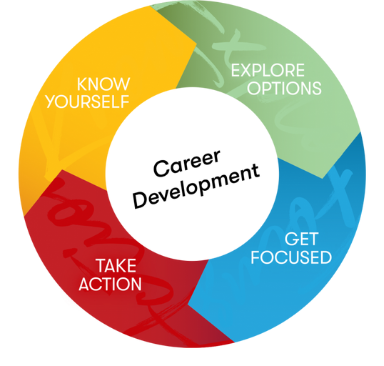Finding Your I: Strengths and Weaknesses

Taking responsibility for your career development starts with knowing yourself and having a realistic view of your abilities and potential. Self-awareness forms the foundation for informed decision-making and intentional career development. But what exactly is self-awareness?
💡 "Self-awareness" is the conscious understanding of oneself, including one's personality, emotions, values, strengths, weaknesses, and motivations.
Self-awareness is the foundation of personal and emotional intelligence. A self-aware individual can look at their own behavior, recognize patterns, understand how they impact others, and identify areas for personal goals. Being self-aware means engaging in continuous introspection in order to:
- Understand your thoughts, feelings, and behaviors
- Have a realistic and accurate perception of yourself
- Remain in tune with your emotions and reactions
Case Study: Kwame and Ama
Kwame and Ama, two ambitious computer science students at Kibo School, are interns at a tech tech startup. Both have excelled in their studies, possessing impressive technical skills and outstanding grades. However, the difference between them lies in their levels of self-awareness.
During the first week, they are each assigned a coding task to complete.
After reading the issue, Kwame realizes he doesn't fully understand the task. He seeks clarification from one of his colleagues, who then offers to walk him through the codebase on a Zoom call. With a strong understanding of what's needed, Kwame is able to fix the issue, and submit a pull request by the end of the week. He receives feedback from his supervisor with suggestions on improving his code. Kwame quickly implements these suggestions, and his pull request is merged into the codebase.
Ama takes a different approach. Though she also struggles to understand the task, she's determined to show that she can work independently. She spends a few days reading documentation and googling. She eventually starts writing code, though she still has gaps in her understanding. After submitting pull request, Ama receives a calendar invitation to speak with her team lead. She points out that Amas completely misinterpreted the task, and will have to redo the code. Ama is visibly upset, and doesn't understand why her supervisor is not praising her tenacity and time she spent figuring this out.
Throughout the internship, Kwame recognizesareas for improvement and invests time in continuous learning. Each week, he meets with a different colleague to share his questions, and learn from them. Kwame's internship experience is marked by steady progression, and he is quickly recognized for his contributions.
Ama, however, is determined to show her technical prowess. She works on all her tasks on her own, without "bothering" others with her questions. Though she is sometimes successful, she often submits work that misses the mark, which leads to frustrations from both colleagues and supervisors. Ama struggles to ask for and adapt to feedback, often dismissing it as unnecessary. As a result, she faces setbacks in her early projects, and her colleagues find it difficult to work with her.
Why Self-Awareness Matters in Career Development
As a university student navigating the job search, self-awareness is critical. Understanding yourself will give you clarity in the job search process and enable you to:
- Target your job search: with a solid understanding of yourself, you can tailor your job search and hone in on opportunities that resonate with your skills and aspirations. Instead of submitting a generic application, you can make a strong case for why a particular job or company fits into your future vision. You can also look for companies whose culture aligns with your personality and work style
- Tailor your application: with a deep understanding of yourself, you can tailor your application materials (e.g., resumes, cover letter, and interview responses) to showcase how you can uniquely and meaningfully contribute to potential employers
We’ll focus the rest of the lesson on building self-awareness by finding your strengths and weaknesses.
Your “I”: Understanding Your Strengths
📺 Watch the video below for an introduction to Strengths Finders (6:39)
Do: Take the Strengths Finders Test
📝 Register on the VIA website and take the strengths finder test here Share your top 5 signature strengths in the padlet below.
How to Find Your Weaknesses
Understanding your strengths, what you offer, and what energizes you is critical to career development. In a similar manner, having a realistic view of your weaknesses will help you grow as a professional.
To identify your top 3-5 weaknesses, you can:
- Learn: Review this list** of common weaknesses. As you skim the list, take note if any resonate with you.
- Reflect: Take dedicated time for introspection. Reflect on your experiences, challenges, and areas where you feel less confident. Consider your performance in various situations and identify patterns of difficulty. Questions to ask yourself
- What tasks do you leave until last on your to-do list?
- What drains your energy?
- When do you have to ask for help?
- Get Feedback from Others: Ask someone you trust, e.g., a friend, family member or classmate, for constructive feedback. Others may provide valuable insights into areas where you can improve or where they've observed challenges in your performance. If you ask someone for their opinion, be open to constructive criticism.
- Analyze past goals: Review personal, professional, and educational goals you’ve set in the past. Identify if there are particular areas (e.g., skills, habits, mindsets) where you consistently face challenges or fall short
Keep a list of your top strengths and weaknesses. You’ll revisit them in the assignment for this unit.